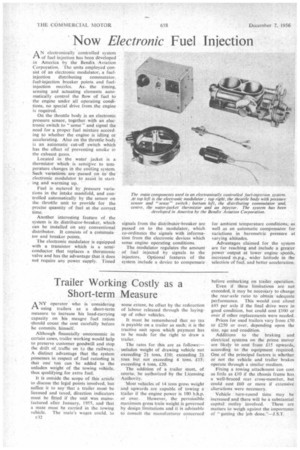Trailer Working Costly as a Short-term Measure
Page 78

If you've noticed an error in this article please click here to report it so we can fix it.
ANY operator who is considering using trailers as a short-term measure to increase his load-carrying capacity on his meagre fuel ration should count the cost carefully before he commits himself.
Although financially uneconomic in certain cases, trailer working would help to preserve customer goodwill and stop the drift of traffic on t..) the railways. A distinct advantage that the system possesses in respect of fuel ratioding is that one ton can be added to the unladen weight of the towing vehicle, thus qualifying for extra fuel.
It is outside the scope of this article to discuss the legal points involved, but suffice it to say that a trailer must be licensed and taxed, direction indicators must be fitted if the unit was manufactured after January, 1955, and that a mate must be carried in the towing vehicle. The mate's wages could, to
1'32
some extent, be offset by the redirection of labour released through the layingup of other vehicles.
It must be remembered that no tax is payable on a trailer as such; it is the tractive unit upon which payment has to be made for the right to draw a trailer.
The rates for this are as follows:— unladen weight of drawing vehicle not exceeding 21 tons, £10; exceeding 2+ tons but not exceeding 4 tons. £15: exceeding 4 tons, £20.
The addition of a trailer must, of course, be authorized by the Licensing Authority.
Most vehicles of 14 tons gross weight and upwards are capable of towing a trailer lithe engine power is 100 b.h.p.
or over. However, the permissible maximum gross train weight is governed by design limitations and it is advisable to consult the manufacturer concerned before embarking on trailer operation.
Even if these limitations are not exceeded, it may be necessary to change the rear-axle ratio to obtain adequate performance. This would cost about £45 per axle if the final drive were in good condition, but could cost £100 or over if other replacements were needed.
Prices for used trailers vary from £50 to £250 or over, depending upon the size, age and condition.
Additions to the braking and electrical systems on the prime mover are likely to cost from £15 upwards, according to the equipment required. One of the principal factors is whether or not the vehicle and trailer brakes operate through a similar medium.
Fixing a towing attachment can cost as little as £10 if the chassis frame has a well-braced rear cross-member, but could cost £60 or more if extensive alterations were necessary.
Vehicle turn-round time may be increased and there will be a substantial capital outlay involved. These are matters to weigh against the importance. of "getting the fob done."—J.S.T.




























































































































